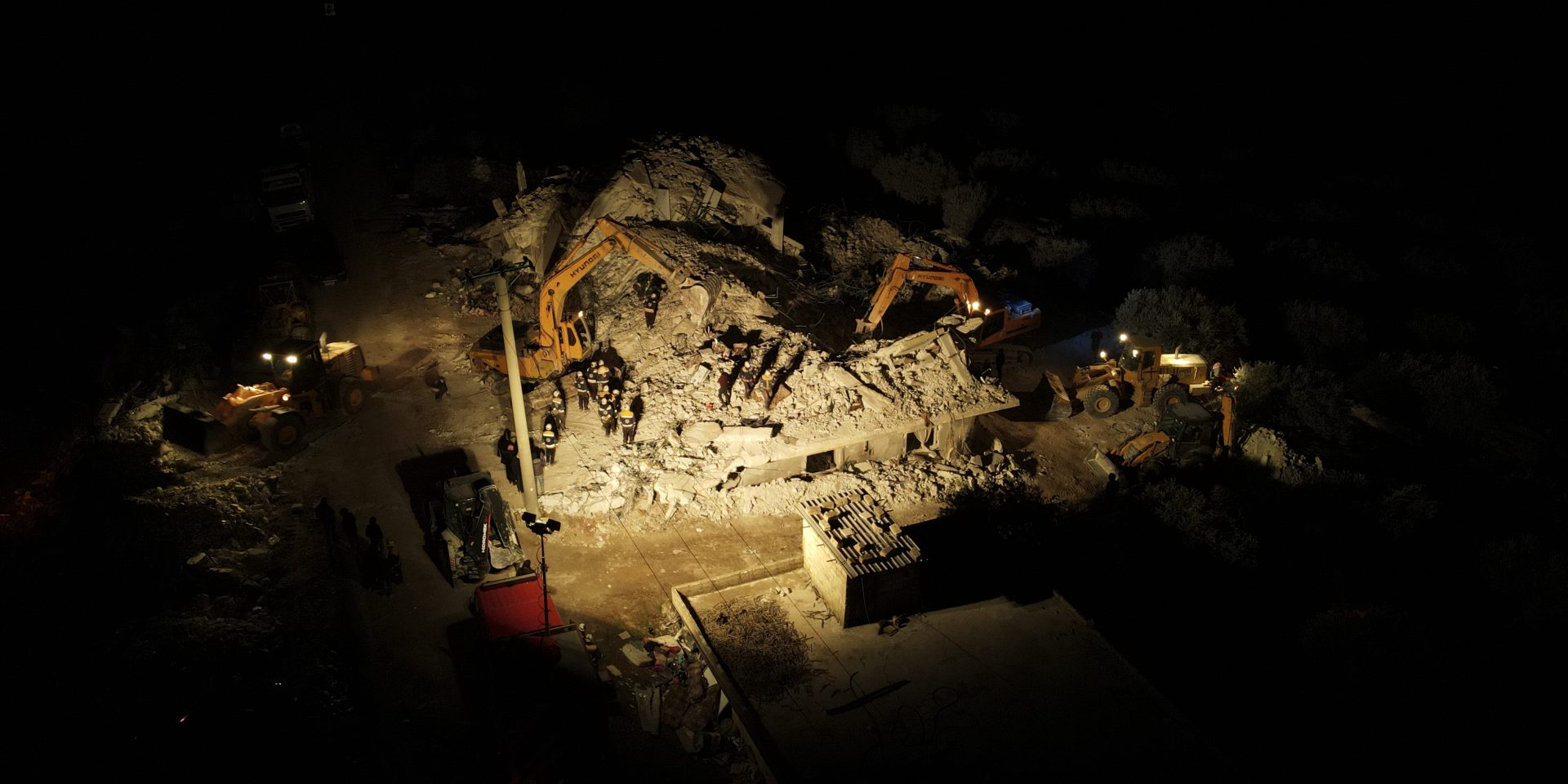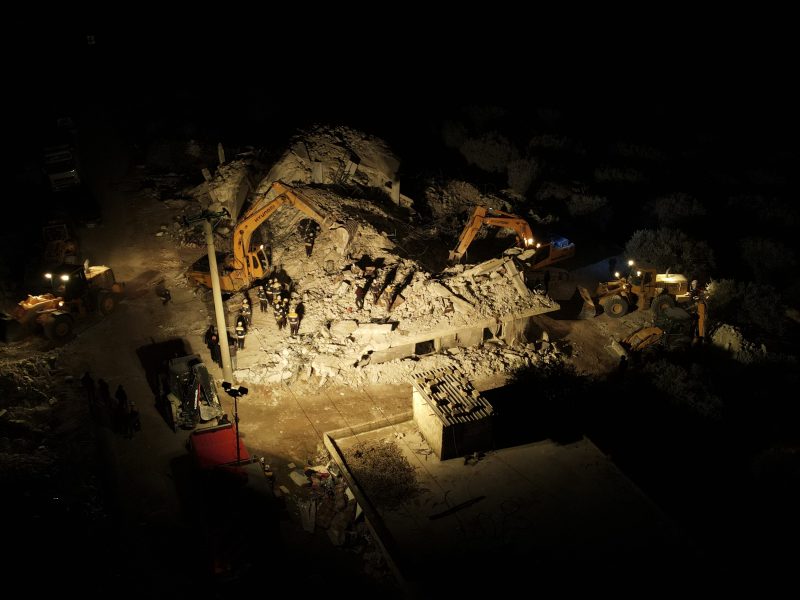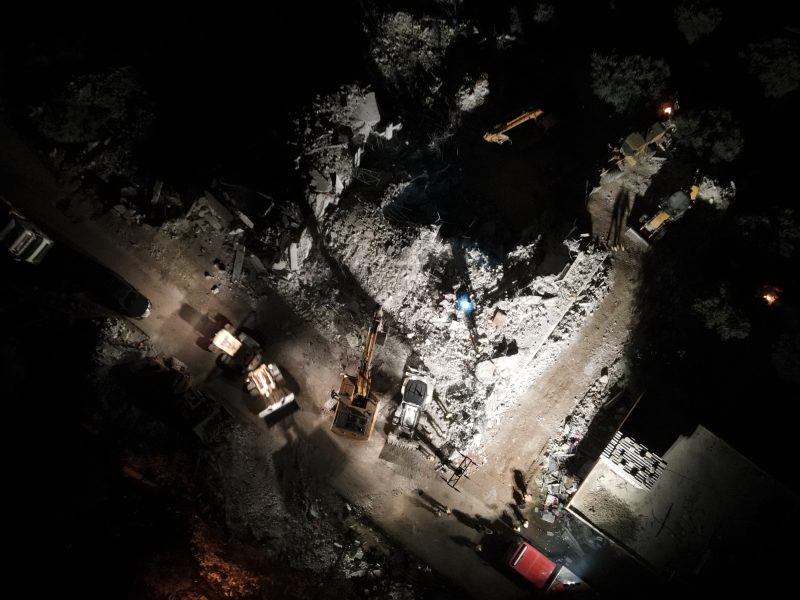Voices from the Earthquake: Two Minutes That Overcame Syria’s 12-Year-Long War
By: Gilgamesh Nabeel
It was four in the morning, on February 6th. Khalil Ashawi, a Syrian photojournalist, and a group of young colleagues were sleeping in their flat in Azaz, a town in northwest Syria. It was subfreezing outside as snow covered neighboring areas.
Having spent the night up, discussing ways to improve an augmented reality (AR) project and conducting a story for Reuters, the team members slept at 3 am in their flat on the 4th floor.
At 4:17 am, everything starts to shake in a terrific way. A well-trained war journalist, Khalil knows very well how to keep his camera and shooting equipment ready. Having covered the 12-year Syrian war, he kept this attitude so that everything should be ready to shoot.
However, the horrific 7.8 earthquake, that hit southern Turkey and northwest Syria, forced Khalil and his team to flee at once, leaving everything behind, including their door keys. Khalil woke up horrified and went downstairs in his T-shirt. Another team member went out topless and barefoot.
On the third floor, Khalil saw a terrified family with children. They were unaware of how to go out. He carried one of the children and ran away. Outside, they stood away from the trembling building. He kept holding the child and calmed him down. When the family came out, he handed the kid to his mother.
A war correspondent who had lost family’s properties in his hometown, in Deir Ez-Zor, east of Syria, Khalil could compare the horror of those two minutes of the two successive quakes to nothing else he had seen over the past 12 years.
“I heard a terrible sound coming from the ground,” he said, “Buildings were collapsing far away. It was quite calm in the town.”
As the earthquake stopped, people remained in terror. “Those two minutes equals all the horrors of the war,” added Khalil, “It resembles nothing else I have ever seen. The damage and human loss are incomparable to anything else.”
Once he realized what had happened, he felt concerned about his siblings who live in Gaziantep and Şanlıurfa, and his parents in Antakya. All these Turkish cities were severely damaged and thousands of Turks and Syrian refugees were killed and left homeless. He even thought about his family in Istanbul, unaware that it was far from the earthquake epicenter about 34 km west of Gaziantep, which is only 97 km away from war-torn Aleppo.
Having survived war destruction and bombardment, Jindires, a town in Afrin in Aleppo’s northern countryside, was most hit by this catastrophic earthquake that affected Aleppo, Lattakia, and opposition-controlled Idlib.
So far, the earthquake’s death toll exceeds 42,000, while over 115,000 were injured in both countries. With over 6,500 destroyed building, the massive quake displaced 2.4 million people and affected over 24 million others. Some estimates the economic loss at $ 50-85 billion.
Earthquake Voices: Anxiety, Fear, and Loss
Apart from the pains of the grief-stricken people on ground, thousands of families spent sleepless nights in search for their relatives from abroad. Some even flied to Turkey or Syria to rescue their beloved one. A Syrian man in France felt concerned to see hundreds of notifications in the family’s WhatsApp group. He checked the messages, learned about the disaster, and found not a single message from his parents. This left him terrified as Antakya, historic Antioch, was severely struck in Monday’s earthquake. So, he took the first flight to Geneva, another to Adana, and then to Antakya to rescue his parents.
The following messages are an attempt to convey the experience of a single family distributed in many of the quake-hit cities.
The man said in a message: “Guys, are you safe? My mother, father, Bari’a and her family, and Muthanna?”
Another: “Stay well, Uncle Abu Ahmed. I hope you will receive this message as I lost connection and could hear nothing. Still cannot get in touch with my parents. We don’t know anything about them. If you know anything about the building, my parents, or their neighborhood, anything, please let me know.”
Another person, texting the missing mother: “Umm Khalil, please let us know how are you doing, mom! The men are looking for you and cannot reach you! Please, let me know so I can tell them if you are alive or something bad had happened! Please, respond to us! Your sons are in search for you, from France, the USA, Istanbul and Urfa! They want to hear your good news!”
Talking to someone in Antakya: “Stay well, Abu Murshid, how are you doing? Are you ok? Are you and yours doing well after this earthquake? We are too concerned about you. Bro, could you please get in touch with my parents, we know nothing about them. We are trying to call them in vain, no coverage, I guess. No mobile phones. Could you please go and see their home, to check if they are good and have no problem? I will be so grateful.”
Another, in Antakya: “OK, OK, they were on the last floor. I will see how I can reach them, there is no coverage there. Could you send me their location? If I can get there, I will update you.”
A rescued woman: Hello Aunt, how are you doing? Are you and your sons safe? We are good, thank God, in the mosque now. This seems a new phone number that I don’t have it registered. It says it is out of coverage or the person is busy. I just wanted to ask about you.”
A man: “Hello Abu Ibrahim, how are you doing? Have you heard anything about my parents? Are you doing well? Are you still on the street or in the garden? How is the situation? Please update us!”
Two days later, the family knew that the parents were rescued from under the rubble.
Abu Samra: “If anything happens, just let me know! If I know something, I will do the same! Thank God, they are safe as I just saw an aerial photo of Antakya, the city is fully destroyed! Thank God they survived.”
Another relative: “I saw all the photos, Abu Samra, that’s why we are afraid. The situation in Antakya is just terrible, you’re right. May Allah save them and keep evil away from them! Thanks, Abu Samra. We will keep you updated.”
After 30 hours, one of their friends was able to reach the semi-ruined building where they were stuck, and helped them
Abu Ibrahim: “Hello Abu Abdo! How are you doing? Hayel arrived to my parents and took them. They are now with him in the car. I sent you a photo!”
While this story ends well, another woman, possibly in Syria, was weeping, afraid her son had been killed in Antakya. She is still in search for him.
The weeping mother: “I saw a photo of someone’s whose face resembles my son’s, He is unknown! I am not sure yet! What can I say? Pray for me to be patient till I make sure!”
Others survived the disaster with irreplaceable loss and broken hearts.
A woman: “Issam’s brother and his sister Wafaa were killed. Issam’s wife, daughters and son, Wafaa’s husband and kids, and his maternal aunt. We cannot count, around 16 persons were killed.”
She added: “Thank God for your safety, we lost our houses and everything! May God compensate us! What matters is that you are doing well. Thank God. We had no internet connection, so you could not get in touch, till we get connected. I am at your sister’s, Afraa. 16 persons of Hussein’s family were killed as well.”





